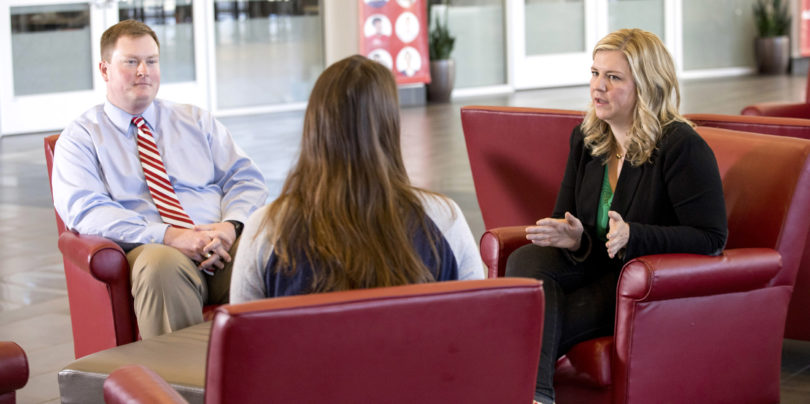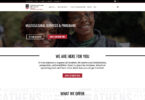University of Georgia students who experience difficult circumstances receive personalized, comprehensive support thanks to an innovative approach by UGA Student Care and Outreach.
This effort is part of the university’s ongoing enhancements to the learning environment, resulting in high levels of student satisfaction and records in application, retention and graduation rates.
This is a proactive model in which Student Care and Outreach staff custom-build campus-wide support networks that are specifically tailored to each student. Beau Seagraves, associate dean of students and director of student care and outreach, said that the program is possible because of excellent collaboration from faculty and staff, as well as robust new student data systems.
“The university gathers student information and documents it in a way that enables multiple campus departments to support a single student, which breaks down silos,” Seagraves said. “We can capture information and referrals from all over campus, and get a sense of what a student might be experiencing and what interventions might be applied, whether they engage with our office or not.”
Student Care and Outreach, a unit in the Division of Student Affairs, can receive a referral from any source — faculty, staff, parents or students — through a public reporting form or by calling, emailing or visiting the office, which is in the Office of the Dean of Students in the Tate Student Center. The staff members schedule their office time, and even their lunches and breaks, to ensure that someone is always available to assist a student when needed.
From the initial report, staff members follow up, gather as much information as possible and determine first steps, which is typically reaching out to the student to offer assistance.
“We share with the student that we support students experiencing difficult circumstances, and that we have the resources necessary to help them out,” Seagraves said. “Our job is to untangle the web of resources and get the students where they need to be the most.”
Possibly due to the nature of UGA’s high-achieving students’ fears of asking for help, the students can be a little apprehensive at first, explained Carrie Smith, assistant dean of students for student care and outreach.
“After the first meeting, we typically see a big change,” Smith said. “From there, they know that asking for help is going to put them in the best position to succeed.”
Once the goals and challenges of the students are fully understood, Student Care and Outreach then customizes a specific plan and campus-wide team to support the student moving forward. For example, an international student with a disability will require resources in the Office of International Education and the Disability Resource Center, as well as their professors, teaching assistants and student organization advisors. Student Care and Outreach may be in touch with the members of this custom-built “team” multiple times, coordinating support and ensuring progress.
According to Smith, this resource coordination is what makes the program a national leader.
“We’re truly creating a tailored network of support across the university,” she said. “We connect students with the resources, keep in consistent contact with those resources, and ensure that support is provided.”
Seagraves and Smith said that UGA is already well-positioned for this approach to be effective, noting the existing collaboration between their office and campus units and the wealth of student resources. Since the university prioritizes resources for students, and the faculty and staff are at the ready to help, all that is needed is someone to coordinate the support, and that is where Student Care and Outreach steps in.
“At this point, it’s just a matter of getting students to contact us and faculty and staff to refer students to us,” Smith said.
Student Care and Outreach continues to fulfill its traditional roles, including contacting and assisting families in cases of severe illness or death, hosting the university’s annual memorial service, and advising students during the hardship withdrawal process, but, as with the new tailored support model, the office continues to broaden its proactive support for students.
One example is that they strive to assist students who may be struggling with incidents in their hometowns. Following the hurricanes in East Texas and Puerto Rico, Student Care and Outreach contacted students from those areas to check on them and their families and offer support.
Yet another example is Embark@UGA, a campus-based effort that provides support to students who have experienced homelessness and/or foster care. By connecting with Embark@UGA, students will benefit from Student Care and Outreach’s custom-built support, with a particular focus on support for the specific needs presented by homelessness and foster care.
“Supporting students is not just something we do to ensure a high-quality academic environment,” said Victor K. Wilson, vice president for student affairs. “UGA is a family, and we truly care about our students. We’re going to do everything we can to give them every opportunity to be successful.”
Seagraves said that the next goal for growing these programs is to do what they can to make everyone on campus aware of Student Care and Outreach. They are off to a good start, having spent the last 18 months speaking to teaching assistants, faculty, staff, student organizations and other campus groups.
“If anyone who is connected with students has a concern about a student, then we encourage you to contact us,” Seagraves said. “Our goal is to help them achieve the goals they have for themselves.”
For more information, contact Student Care and Outreach at 706-542-7774 or visit the Office of the Dean of Students website at dos.uga.edu.








